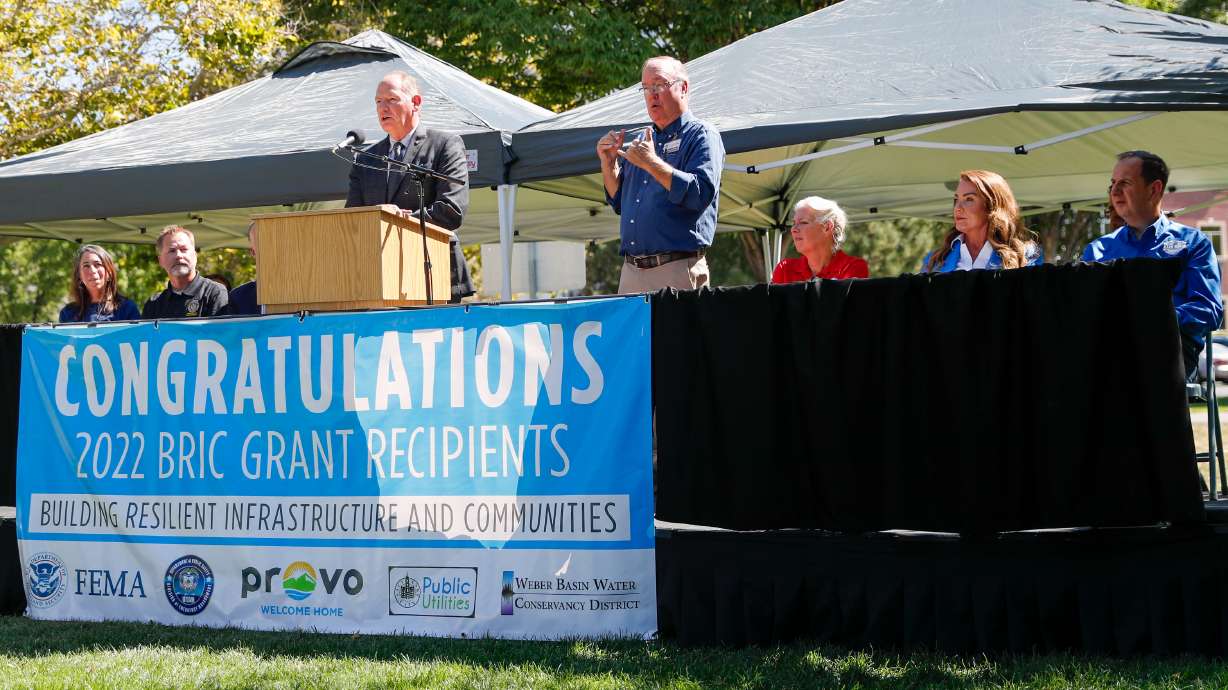Estimated read time: 3-4 minutes
This archived news story is available only for your personal, non-commercial use. Information in the story may be outdated or superseded by additional information. Reading or replaying the story in its archived form does not constitute a republication of the story.
PROVO — Three Utah "resiliency" projects are set to receive about $109.3 million from $1.16 billion in new federal grants aimed at helping local and state governments "undertake hazard mitigation projects, reducing the risks they face from disasters and natural hazards," according to the Federal Emergency Management Agency.
On Monday, state and federal emergency management leaders gathered with local leaders to discuss the impact of the three projects that received money from the FEMA's Building Resilient Infrastructure and Communities and Flood Mitigation Assistance programs.
- $51 million to help build an aquifer storage recharging system in Provo
- $36.68 million to help rebuild and retrofit the Salt Lake City water treatment plant in City Creek Canyon
- $21.59 million to help construct a pipeline project in the Weber Basin Water Conservancy District
The Provo project, which received a large portion of the funds in Utah, aims to build a pipeline from underground aquifers to a treatment facility before water is pumped into the city's culinary water distribution system. The project also includes a component to recharge the groundwater.
City officials contend that the project bypasses evaporation concerns, which consume about 380,000 acre-feet of water in Utah Lake, or about 52% of Utah Lake's annual inflow.
Provo Mayor Michelle Kaufusi praised the project, saying that the aquifers in the area have been "in decline" for the past 70 years. She added that the treatment plant "will function as a secondary treatment source."
"Lastly, the treatment plant allows Provo to implement an aquifer management program, ensuring a long-term, sustainable water supply for Provo City and the surrounding region.
"Aquifer management and groundwater storage are part of Provo's comprehensive water management, which involves drinking water, stormwater and wastewater," she said. "Provo City is being waterwise — in the short term, by encouraging citizen water conservation; and in the long term, by emphasizing groundwater storage, recycling, re-use and other sustainable methods that reduce demand for new water, limit evaporation losses, protect water quality, and align with natural recharge."
The Salt Lake City project centers on improving the City Creek Water Treatment Plant by "addressing existing structural deficiencies to improve facility performance during and recovery after, a seismic or flood event," the project description says.
The plant was first constructed in 1953 but has deteriorated over time. City officials made the decision two years ago to rebuild the plant in phases, according to city officials.
"These improvements will help to ensure continued delivery of high-quality drinking water and required fire flow (supply and pressure) for the service area," the project description adds.
Meanwhile, the final $21.6 million will head to Weber Basin Water Conservancy District for a 12,000-foot earthquake-resistant steel pipe and emergency pump station to deliver water in emergencies. The pipeline will "begin essentially at the same location as the current aqueduct" and travel south to the Davis North Water Treatment Plant, according to FEMA.
The three Utah projects are among 271 across 53 U.S. states, tribes, territories and the District of Columbia that Vice President Kamala Harris, Homeland Security Secretary Alejandro Mayorkas, and FEMA administrator Deanne Criswell announced earlier this month.
"Climate change poses a very real threat to the safety, security and prosperity of the United States. Its impacts are being felt in real-time and are felt most acutely by the nation's most vulnerable communities," Mayorkas said at the time. "While we can't eliminate the threats we face as a nation, we can and must build our resilience against those threats ... because, together, we are building climate resilience."
FEMA will begin accepting proposals for the 2022 fiscal year round of funding starting on Sept. 30. Communities will have until Jan. 27, 2023, to submit ideas for projects that "address high-level future risks to natural disasters such as wildfires, drought, hurricanes, earthquakes, extreme heat, and increased flooding to foster greater community resilience and reduce disaster suffering."









